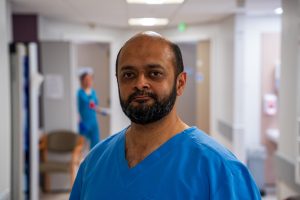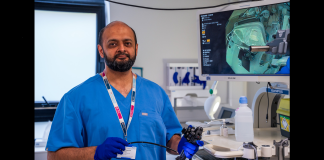A leading Bradford liver specialist is calling on people to confirm their donation decision and join the NHS Organ Donor Register today, as he says too many patients are dying, waiting for the transplant that never comes.
Consultant Hepatologist, Doctor Muhammad Salman, who is based at Bradford Royal Infirmary, part of Bradford Teaching Hospitals NHS Foundation Trust, said he works with patients as young as 16-years-old who are desperate for a new organ.
“Currently more than 8000 people are waiting for a transplant across the UK, out of which one third are from our ethnically diverse communities,” explained Dr Salman.
“Unfortunately, nearly 18% of these patients nationally will have passed away in 12 months waiting for a liver transplant, which is nearly one in five, and this is quite significant.
“Currently 188 have been listed for a transplant – with eight of these waiting for a new liver and 167 waiting for a new kidney. In the last four years alone, 24 people have died here in Bradford waiting for a range of major organs, including livers.
“I absolutely would join the organ donor register because giving an organ, and an important organ such as liver, is saving someone’s life.”
When a Bradford patient has liver failure or end stage liver disease, they are ‘listed’ for a transplant at the regional liver unit which is based at St James’s Hospital, in Leeds, provided they fit strict NHS criteria to undergo this major operation.
They remain under the care of Bradford before and after their transplant. Once a patient is ‘listed’, they are told by their doctors how much time they potentially have left to live if they don’t receive a new organ.
Dr Salman continued: “Generally your mortality ranges anywhere between 30 to 40% over the next 12 to 18 months. It is a mortality which is much worse than people with advanced cancer.

Image: BTHFT
“When you tell patients they could have a certain amount of time left before they could die if they don’t get a transplant – understandably and quite appropriately – their first impression is of initial shock. Some patients go into a phase of a complete denial but slowly, when things settle, and the information is processed, they come round and have a more positive attitude.”
A successful transplant involves a multitude of factors according to Dr Salman who added that a significant factor is keeping patients “as fit and healthy from a nutritional point of view, keeping them away from infections, illnesses and diseases, to the best of our ability, so that when their time comes, they are in a very good condition to go into the transplant”.
Other factors then come into play, for example the type of operation the patient has, the liver they receive, intraoperative complications, and how quickly they will recover.
“The problems of getting people from ethnically diverse backgrounds to confirm their decision around organ donation ranges from social taboos to cultural stigmas and religious beliefs,” he continued.
“My strong advice to the community and general population would be to educate yourself and ‘opt in’ for organ donation. About one third of people waiting for a transplant, will not be here in a year’s time.”
He also highlighted that a recent survey had showed that “nearly 60% of our ethnically diverse communities nationally will consider a liver transplant if offered to them, however, only 20% of them will actually agree to be a donor.”
He added: “Have a discussion with your GP or your health services, talk to your family. Look at the importance and the big difference that you are going to make to someone’s life.
“You are continuing the legacy of your loved one and seeing another person prosper, so I think psychologically and mentally, as well as emotionally, there is a lot of benefit to it.
“If we tell a patient that they have got 12 to 18 months to live, and their mortality is nearly 30 to 40%, their whole life stops, they can’t make any plans.
“They do not know what will be happening in a year or a couple of years’ time. But as soon as they get a liver transplant, their life takes a turn in a very, very positive direction.
“We need to start discussions about the benefits that transplantation could give to not only one person, but the whole family.”
Dr Salman concluded: “I think that if you were the person who would want a liver, if needed, then there should be no reason for you not to donate one, so that you can save someone else’s life and give them a new lease of life and, in that whole process, be remembered for your legacy.”
To find out more, and confirm your support for organ donation, visit www.organdonation.nhs.uk, call 0300 123 23 23 or use the NHS app.




